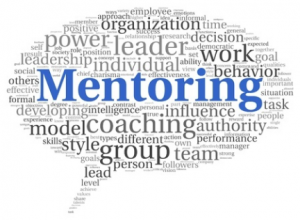Survey Results from Business Mentoring Program Administrators
 This summer, River hosted two webinars focused on mentoring. One was about building a mentoring culture, and the second was about getting the most from mentoring conversations (you can watch the recordings from our Webinars page, or sign up for any of our upcoming live events). Attendees at both webinars shared insights and opinions with us, which we in turn are thrilled to share with you.
This summer, River hosted two webinars focused on mentoring. One was about building a mentoring culture, and the second was about getting the most from mentoring conversations (you can watch the recordings from our Webinars page, or sign up for any of our upcoming live events). Attendees at both webinars shared insights and opinions with us, which we in turn are thrilled to share with you.
As providers of mentoring software, it won’t shock you to know that we think mentoring software is crucial for running a mentoring program. One key reason for this belief is that technology allows you to scale a mentoring program so that more people can be involved. On top of that, you can offer various types of mentoring all through a single interface without needing additional administrative resources.
 The attendees at our webinar on mentoring conversations told us that they use multiple types of mentoring in their organizations. In fact, 91% of respondents said they use a combination of mentoring types. These types include mentoring pairs, mentoring groups, situational mentoring, peer mentoring, and reverse mentoring. Now imagine trying to run a mentoring program that leverages two or three of these types of mentoring—but without mentoring software. The amount of time, energy, money and more that would be required would make this a losing battle. But with mentoring software, program administrators can take advantage of the best options available in the world of corporate mentoring (be it pairs, groups, reverse, etc.), and be able to effectively and efficiently scale and deliver it.
The attendees at our webinar on mentoring conversations told us that they use multiple types of mentoring in their organizations. In fact, 91% of respondents said they use a combination of mentoring types. These types include mentoring pairs, mentoring groups, situational mentoring, peer mentoring, and reverse mentoring. Now imagine trying to run a mentoring program that leverages two or three of these types of mentoring—but without mentoring software. The amount of time, energy, money and more that would be required would make this a losing battle. But with mentoring software, program administrators can take advantage of the best options available in the world of corporate mentoring (be it pairs, groups, reverse, etc.), and be able to effectively and efficiently scale and deliver it.
Another interesting finding came from our webinar on building a mentoring culture. We asked participants, who were mainly talent development leaders and HR professionals, what they were hearing from Millennials in terms of what that generation wanted from development opportunities. We received some wonderful responses that help expose the driving desires behind this large (and growing!) employee population.
Some attendees said Millennials want customized learning with lots of hands-on activities, and that they want to learn at a quick pace. Others homed in on the fact that Millennials want easy access to resources and senior leadership, and that they are looking to develop their leadership competencies (and emotional intelligence) so that they can fast track their advancement. Related to this were some comments from attendees that Millennials want more defined career paths and want to know what opportunities are available that their employer can offer them related to that.
 Perhaps most telling, though, were the comments from people who said Millennials want a voice. As some participants put it, “They want to be recognized, and they want an opportunity to pass on what they know in turn.” This is absolutely where mentoring programs come in! Reverse mentoring can have a huge impact on Millennials being able to share what they know with more senior employees and leaders. Peer mentoring can also benefit Millennials as they seek to make connections with their colleagues across functions, locations, etc. Unfortunately, some organizations still lag behind when it comes to offering a structured mentoring format of any kind, leaving employees with little support and no voice at all. As one participant said, “As a millennial myself, I keep being told I need more experience, but have no program or support from my organization to help me.”
Perhaps most telling, though, were the comments from people who said Millennials want a voice. As some participants put it, “They want to be recognized, and they want an opportunity to pass on what they know in turn.” This is absolutely where mentoring programs come in! Reverse mentoring can have a huge impact on Millennials being able to share what they know with more senior employees and leaders. Peer mentoring can also benefit Millennials as they seek to make connections with their colleagues across functions, locations, etc. Unfortunately, some organizations still lag behind when it comes to offering a structured mentoring format of any kind, leaving employees with little support and no voice at all. As one participant said, “As a millennial myself, I keep being told I need more experience, but have no program or support from my organization to help me.”
We can do better than this…and we need to do better than this. Our employees are counting on us. They need our support and access to programs and resources so that they can become remarkable contributors to our organizations. And our organizations are counting on us to provide them with the right guidance and tools so that our employees and our companies can thrive. This is why mentoring software is a game-changer for organizations. It can offer the type of connections, insights and development opportunities that people crave, and it can do it all for a reasonable price and in ways that can impact employees across the organization.
Mentoring software is certainly not a cure-all, but it is definitely a tool companies need to consider in their quest to provide their employees with development opportunities and support.
Contact us on to see why River is an award-winning option for mentoring and development.








